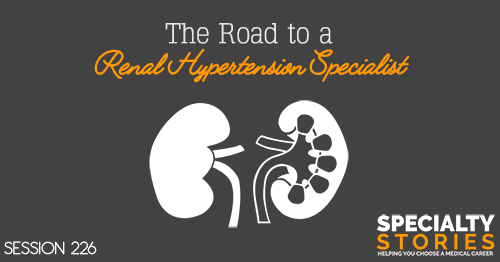Apple Podcasts | Google Podcasts
Session 173
Dr. Ian Storch is a community and private practice gastroenterologist. He joins me to bust myths, talk lifestyle, and give tips to future GI docs.
Ian is a DO and if you’re interested in DO or would like to know more about it, check out Ian’s D.O. or Do Not Podcast.
For more podcast resources to help you along your journey to medical school and beyond, check out Meded Media. And of course, don’t miss to sign up for a free two-week trial on Mappd to get some help on your premed journey!
Listen to this podcast episode with the player above, or keep reading for the highlights and takeaway points.
[01:05] Interest in Gastroenterology
Ian found his internal medicine rotation as a third-year medical student to be very stressful being that it was all new to him. He didn’t understand what was going on with the patients. Then he encountered a mean resident who ripped up his notes and told him what a terrible job he was doing.
And he was sitting there looking at the chart and thinking maybe he had made a bad career choice. And then a gastroenterologist came over and sat down next to him and asked me to see the patient with him and talk about the case. He went to the room with them and evaluated the patient, and did a physical exam together. He just thought he wanted to be like him when he grows up and that’s how Ian ended up in GI.
'Mentorship really drives people's career decisions.'Click To TweetIt just takes that one person to spend some time with you and care about you and show you some love and it could really just change your whole career trajectory.
[03:12] Traits That Lead to Being a Good GI Doctor
The most important thing about a good gastroenterologist is to be a good internal medicine doctor. You really have to love medicine and have a very broad understanding and knowledge base. Aside from that, you have to be able to listen to patients and form relationships with patients.
The nice thing about GI is it blends that internist with just a little bit of a surgeon. They’re not surgeons, but they do a lot of invasive procedures. So you have to have some technical skills and some interest in doing procedures.
[04:24] The Biggest Myths or Misconceptions Around GI
A lot of medical students and residents think that they just scope all day. And again, when you’re rotating, in medical school or as a resident, you’re really spending a lot of time watching procedures, and not going into the rooms. That’s great and glamorous, but there’s really a lot more to the job than just the procedures.
'The internist portion of the gastroenterologist is the most important.'Click To TweetAnother misconception is that as a GI doctor, you’re in poop all day long. There are a lot of anuses but not a lot of poop. Otherwise, your scopes aren’t going very well. There are a lot of jokes about GI but it’s not really a major part of the job. Usually, people are cleaned out by the time they’re getting to the GI doctor.
[06:15] Other Specialties Ian Considered
Ian also considered plastic surgery. But ultimately, he just went to medical school to help people. Not that a plastic cosmetic plastic surgeon doesn’t help people, but it’s just not in the way that he envisioned his life. So that got scratched off.
Ultimately, he loved internal medicine and cardiology. And there are a lot of internal medicine subspecialties that he loved. He even loved general internal medicine. But then again, it was just because of his mentorship that he ended up in GI.
[07:30] Types of Patients
GI doctors treat a lot of pathologies ranging from screening colonoscopy to rectal bleeding or black stools with ulcers. A big part of their job is doing procedures like endoscopy and colonoscopies to prevent colon cancer or prevent esophageal cancer in people with reflux, looking for Barrett’s, and things like that.
They also take care of patients with swallowing issues. They have a lot of organs, including the liver and pancreas so that’s a whole separate realm of gastroenterology. They don’t only take care of the intestinal tract, but also patients with liver abnormalities and pancreatic problems.
The majority of their patients, around 80%, come to them for a diagnosis. Their primary doctors are overwhelmed with so many problems like blood pressure, cholesterol, etc. They have 10 complaints the patient comes in with. So when a patient has a specific GI complaint, they are usually preferred for a GI workup.
'The joy of gastroenterology is figuring out what's wrong with the patient and helping them.'Click To Tweet[09:44] Typical Day or Week
Ian admits to being a workaholic so he doesn’t really recommend for others to follow him. But he loves his job. So he’s usually up by 4:30 am. He goes to the hospital and rounds his patients early in the morning.
Ian works in an outpatient setting but sometimes they get consulted on patients that are in the hospital. There’s definitely a large group of people in private practice that no longer go to the hospital. Some GI doctors use a hospitalist to take care of the patients in the hospital. But Ian assures his patients that he will take care of them whether they come to his office or they’re in the hospital.
Ian has endoscopy days, which usually start at 7:30 am. He starts doing procedures and colonoscopies that are elective, and that goes till about 1:30 pm. And then he will do office hours until about 5 pm.
On his clinical days, he sees patients from nine until five. And then again, at the end of those days, he will usually head back to the hospital either to do emergency procedures if they’re needed or to see consultations if they’re requested.
Procedures are probably about 30% of his week, and the other 70% are clinical. The blending in gastroenterology is one of the things that really drew him to his specialty because he could do everything. He could do some procedures and see patients and have relationships.
[12:46] Taking Calls and Life Outside of the Hospital
Ian is in a small private practice. He has a partner and he takes most of the calls at night. It’s very rare for him to get called in the middle of the night, specifically, no more than a few times a year.
If the person’s bleeding you need to go in. Blood transfusion takes three or four hours. You need to give them a couple of transfusions to make the procedure safe. And you have to fill the tank before you give them anesthesia for the procedure.
But usually, the main reason he would have to go to the hospital in the middle of the night would be something like a food impaction. Sometimes people could have a narrowing in their esophagus and that’s actually an emergency because they can aspirate. Fluid and food can go down the wrong pipe. So, if someone has a food impaction you’d have to go in. Sometimes he also goes in for bleeding, especially if they have cirrhosis and veins in their esophagus. But for the most part, he doesn’t get woken up in the middle of the night.
Ian likes his life busy. He has a wife and two kids. And he describes his wife as the Yin to his Yang. She takes care of the kids and the house. And he takes care of his patients. He makes time for his kids and his family. And everything just works out perfectly for him.
[16:57] The Training Path and Subspecialty Opportunities
You need to do three years of internal medicine first. Ian had the privilege of doing a chief resident year, which was an extra teaching year. It allowed him to help run the residency program for one year. You don’t need to do that. But because GI is so competitive, it definitely helps to do that year.
And then you do three years of gastroenterology fellowship. It used to be two years but it was extended to three years. And now even beyond that, there are sort of subspecialties for a year in gastroenterology that you can do.
The advanced procedures now usually take an extra year. There are things like liver disease and transplant that’s an extra year. Some places have a nutrition year. There’s an inflammatory bowel disease year. And a motility year where people look at movement disorders of the esophagus. Again, a lot of these things can be done in a three-year time frame depending on where you are. But if you want to really subspecialize in an academic center, many people go on to do an extra year. So again, three years of internal medicine, three years of GI, and then one year of subspecialty.
[19:20] Where Does Transesophageal Echocardiogram Fall?
A cardiologist does the transesophageal echocardiogram. It’s a very similar technique to what they use for endoscopic ultrasound. The tube is sort of a blind tube so they don’t have a camera at the end. They always get a little concerned when patients have problems swallowing in their history because one of the risks is perforation. And sometimes they’ll ask the GI doctors to come and look with an endoscope or a camera to make sure it’s safe before they do it.
Their ultrasound probe has a camera at the end so they can guide it and look into the mediastinal structures. And they look at other things around the esophagus, like lymph nodes, and they can stage tumors.
Again, they can go into the stomach and see organs around the stomach and the duodenum such as the pancreas. And for example, if someone had a tumor in the pancreas, they could use the ultrasound to see through that organ. They can very easily get a biopsy in ways that would be very difficult, per se, for someone like an interventional radiologist that would be doing the biopsy through the abdomen.
[21:30] How to Competitive for a GI Fellowship
Cardiology and GI are probably the most competitive specialties. But Ian believes GI is a little more competitive because there are fewer spots for GI than cardiology.
'If you want to be a gastroenterologist, you have to really make yourself look better than a lot of candidates because there are a lot of candidates applying.'Click To TweetThere are a few chief residents chosen to run the medicine program for the year. It is an extra year and it is a loss of revenue for a year. But if you want to do GI, Ian recommends doing it because it’s a great year, and you’ll learn a lot about medical administration and taking care of a program.
Secondly, it usually sets you up for the fellowship in your program, at least. And if you’re looking to go somewhere else, it shows that you’ve proven you’re at the top of your group. So that chief resident year is huge.
Certainly, research always helps in any specialty that’s competitive. If you want to stand out, showing that you can do research is a big factor. GI is so competitive and there are so few spots. It’s therefore invaluable to make a name for yourself in your institution and make yourself known to the doctors that are making the decision on the position. Show them how you love this specialty and that you’re committed and that you’re going to work hard when you get there.
[23:22] Community Setting vs. Academic Setting
Choosing between a community setting and an academic setting was a tough decision for Ian to make. In the fellowship where he did the chief year, he was thinking about academics. And it’s a very different practice being an academic versus being in private practice.
On one side, being in academics, you get to do the cool stuff and do the fancy procedures. You get to do the things that are fun and the things that no one else can do. On the other side, usually, those doctors are employed physicians. They work for the hospital and their following is brought in by the institution, which is also great.
The downside to private practice is you’re not doing those fancy things, you’re doing more bread and butter procedures, and you’re seeing more bread and butter patients. On the plus side, you can own your own business and run your own practice which certainly has its own headaches.
At the end of the day, it’s yours and the patients are coming to see you for your reputation. And again in the same light, you’re building relationships with people and connecting with people in a way that academic doctors probably don’t have.
“The downside to private practice is you're not doing those fancy things. But it’s yours and the patients are coming to see you for your reputation and you’re building relationships.”Click To TweetSo there are definitely pros and cons. But all those being said, Ian decided he wanted to have his own practice, his own business, and his own patients.
[25:34] Overcoming Bias Against DO Physicians
Ian went to osteopathic school, to the New York College of Osteopathic Medicine and he had an amazing education there. When he was applying for residencies, he actually chose his residency program because he had worked so hard there. In fact, the chief of GI told him that if he did half of what he did as a medical student, they’re giving him a spot.
He had offers from other hospitals like Mayo Clinic and Cleveland Clinic. At the time, they were able to sign outside the match. So it was a little bit different than it is today. But he stayed at that hospital with the understanding that he was going to stay and do GI.
And he found it more challenging than he thought it was because of one specific person’s bias.
So he ended up going to the University of Miami for Gastroenterology. And he feels blessed to have gone there because he was trained by some of the best people in the field. Then when he was at the University of Miami, there was a DO who did GI when he was leaving since Ian was actually the first DO there.
Sometimes there are biases against people that are purple, or against people that are too thin, or that are too heavy. There’s always going to be somebody with a bias. But being a DO does not hold you back from doing a competitive specialty.
“Being a DO does not hold you back from doing a competitive specialty. If you want something competitive, you have to figure out how to make yourself shine.”Click To TweetLike everybody else, if you want something competitive, you have to figure out how to make yourself shine. And if you work hard, and you do go the extra mile, you can do whatever you want as an osteopath. And Ian is concrete proof of that.
[28:02] Message to Future Primary Care Doctors
Ian wishes to tell primary care doctors that they are rockstars.
Specialists are always focusing on specialty care, but it’s really the primary care doctors that make the difference. They are the quarterbacks for the patient’s care.
For example, when he makes a diagnosis of colon cancer, the patient had to see the primary care doctor first. And that primary care doc had to convince a healthy 50-year-old that they needed to go for a screening test to help prevent colon cancer. And that’s not an easy task.
'Primary care doctors are rockstars.'Click To TweetAnd then they came to his office because their primary care doctor explained to them and really pushed them to get a screening colonoscopy. So by the time they’re in his office, he does the colonoscopy, finds a polyp, and removes it, and that’s great.
The subspecialist is always the one that’s thanked, but the primary care doc is a rockstar. And Ian thinks they don’t acknowledge that enough. The job they’re doing is so important and much more important than what any of the subspecialists do.
[29:32] Other Specialties They Work the Closest With
A gastroenterologist relies on a lot of other specialists to care for patients. GI doctors do colonoscopies, endoscopies, and biopsies. So they need a good pathologist, who is making the diagnosis after you do the biopsy.
They also rely very heavily on the radiologist. Learning how to read CAT scans was a very important part of being a gastroenterologist and Ian still thinks this is true. That said, he’s not a radiologist. So ultimately, he needs a good radiologist to interpret films. There’s a huge art to interpreting images. So the radiologist is super important to his practice.
And ultimately, the person he needs to support him is always the general surgeon or the colorectal surgeon, or the pancreaticobiliary surgeon. A lot of times, there are things that are serious, like cancer, or things that he just can’t fix. Some patients have inflammatory bowel disease. He gives them medication and they fail. And so, he needs a good surgeon to help him when the patient has gone beyond what he can fix with medical management.
[31:14] What He Wished He Knew Before
When he was a premed and medical student, he was always worried about things and how things would work out.
[32:11] The Most and Least Liked Things
Ian says he likes everything about being a GI. He feels blessed to have people trusting him to take care of them. He loves the procedures and he loves talking to people and interacting with other doctors. There’s nothing else he would rather do than being a gastroenterologist.
On the flip side, what he likes the least is charting. Charting is terrible and if you don’t like it, get a scribe. So there are ways around that.
[33:31] Major Changes Coming to the Field
There have been a lot of advances in the GI field specifically for screening. There are very exciting technologies like capsule endoscopy, which is a little movie camera that you swallow. It looks at the small intestine, but at some point, maybe sort of primetime for looking at the colon.
If he had to do it all over again, Ian says he would definitely go into medicine, be an internist, and probably GI. But he just loves medicine so much that it really doesn’t matter what he went into. He would be thrilled to have any role as a physician. Regardless, he would still have a great time.
[35:04] The DO or Do Not Podcast
Ian is a big fan of paying forward. He went to osteopathic school, and if it wasn’t for the DOs and osteopathic medicine, he wouldn’t be where he is today. He didn’t apply to MD schools because he wanted to be a DO.
But again, without the DOs, he would not have gotten the education he got. And again, he wouldn’t be living the life he’s living now.
So Ian started a podcast with a great group of premedical and medical students interviewing DOs to document the osteopathic journey and hear about how they got to where they are, what their successes were, and what their hardships were.
Now with 30 episodes in, the D.O. or Do Not Podcast is for anybody interested in osteopathy.
[37:02] Final Words of Wisdom
Internal medicine is a great specialty. Internal medicine guys are usually the smartest guys in the room. The thing that makes Ian the proudest of his education is that he’s a board-certified internist and does upkeep his board certification.
If you do decide to do a specialty, that’s great. If you’re passionate about something like endocrinology, rheumatology, gastroenterology, any of these things, go for it. If you want to do something very competitive, there are going to be sacrifices.
'Any student should never feel that anything is outside of their reach. They just need to stay focused and understand what sacrifices need to be made.'Click To TweetLinks:
SEARCH SITE
LISTEN FOR FREE












